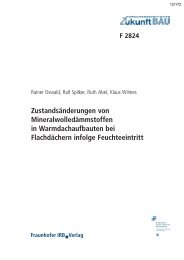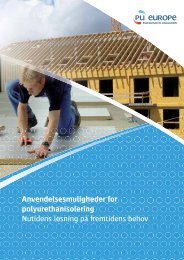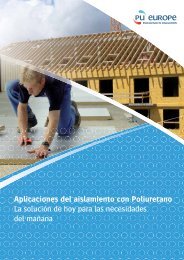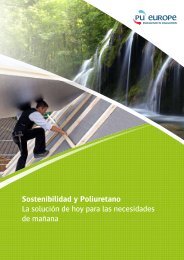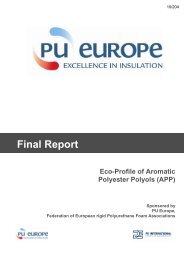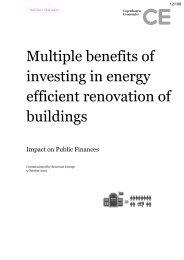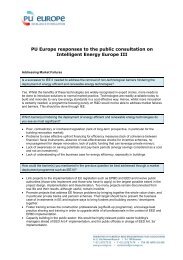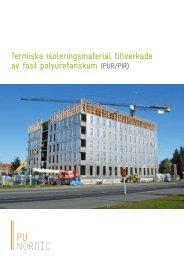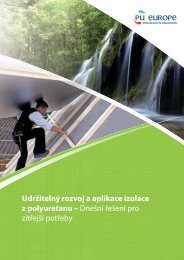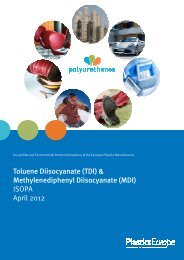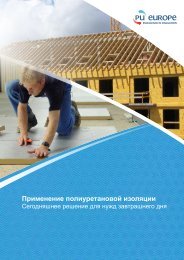BPIE: Europe's buildings under the microscope - PU Europe
BPIE: Europe's buildings under the microscope - PU Europe
BPIE: Europe's buildings under the microscope - PU Europe
Create successful ePaper yourself
Turn your PDF publications into a flip-book with our unique Google optimized e-Paper software.
Table 2B5 – Reported steps in <strong>the</strong> period October 2010-June 2011 planned to be <strong>under</strong>taken towards <strong>the</strong> EPBD<br />
recast implementation by country<br />
Source: <strong>BPIE</strong> survey<br />
Steps being taken towards implementation of EPBD recast<br />
AT<br />
BG<br />
CH<br />
CY<br />
CZ<br />
DE<br />
DK<br />
EE<br />
ES<br />
FI<br />
FR<br />
GR<br />
HU<br />
IE<br />
The basis document for <strong>the</strong> revision of building codes and for <strong>the</strong> development of Austrian Standards, <strong>the</strong> OIB<br />
Richtlinie 6, is in <strong>the</strong> process of being revised according to <strong>the</strong> requirements of <strong>the</strong> EPBD Recast.<br />
The implementation of <strong>the</strong> new provisions of <strong>the</strong> Directive has started. A national definition of nZEB is in a stage of<br />
preparation.<br />
The cantons have launched a study (planned to be finalised till <strong>the</strong> end of 2011) to analyse <strong>the</strong> impact of <strong>the</strong> recast<br />
EBPD on Switzerland and propose various scenarios on how to develop <strong>the</strong> Swiss energy policy in <strong>the</strong> building sector<br />
in <strong>the</strong> context of <strong>the</strong> recast EBPD.<br />
The Energy Service has launched inquiries in <strong>the</strong> residential sector for detached houses, terrace houses and apartment<br />
<strong>buildings</strong> in four meteorological areas of Cyprus. Moreover, in cooperation with <strong>the</strong> Cyprus Land Development<br />
Corporation, The Energy Service has agreed to build dwellings with nearly zero energy.<br />
Czech Green Building Council prepares proposal to upgrade decree 148/2007 Coll. with gradual transformation of new<br />
building and major renovations from today´s standards via low-energy and passive building to nearly Zero Energy<br />
Buildings till 2020.<br />
In <strong>the</strong> 2012 amendment to <strong>the</strong> Energy Saving Ordinance (Energieeinsparverordnung) a “climate-neutral” building<br />
standard (based on primary energy indicators for all new <strong>buildings</strong> by 2020) will be introduced as required by <strong>the</strong><br />
recast of <strong>the</strong> EPBD 2010.<br />
A definition of nearly Zero Energy Buildings and an action plan for increasing <strong>the</strong> number of nearly Zero Energy<br />
Buildings are being drafted by <strong>the</strong> Danish agencies responsible for <strong>the</strong> policy.<br />
No official steps towards implementation of EPBD recast, but more detailed analysis on how to ensure application of<br />
standards for low energy <strong>buildings</strong> and nearly Zero Energy Buildings has started. The legislation will be reviewed on<br />
<strong>the</strong> basis of information received from latest studies on application of minimum energy performance requirements in<br />
Estonia and <strong>the</strong> EPBD recast.<br />
The responsible committees for reviewing <strong>the</strong> DB-HE, <strong>the</strong> Technical Building Code and <strong>the</strong> RITE (Regulation of Thermal<br />
Installations in Buildings) have strated <strong>the</strong>ir work. The first revision of <strong>the</strong> codes were planned for end 2010, <strong>the</strong><br />
second for 2015-2016 and <strong>the</strong> last -with nZEB requirements- for 2020..<br />
The revision of <strong>the</strong> energy efficiency part of <strong>the</strong> building bode is now being finalised for entering into force in <strong>the</strong><br />
beginning of <strong>the</strong> year 2012. It will bring <strong>the</strong> specific heat consumption of <strong>the</strong> new <strong>buildings</strong> to a low-energy level.<br />
The Grenelle Energy and Environment law has set a goal of net zero energy constructions in 2020. The next coming<br />
(2011-2013) energy code – BBC (Bâtiment Basse Consommation) – sets <strong>the</strong> performance of new constructions as<br />
very low energy consuming <strong>buildings</strong> at an average of 50kWh/m 2 (in terms of primary energy) for space heating and<br />
cooling, domestic hot water production and lighting. The calculation method and <strong>the</strong> <strong>the</strong>rmal code entail <strong>the</strong> concept<br />
of zero energy <strong>buildings</strong> as a voluntary interim goal.<br />
Article 10 of <strong>the</strong> law 38851, issued in June 2010 transposes <strong>the</strong> recast Directive in to <strong>the</strong> Greek legislation. It foresees<br />
that up to 31/12/2019 all primary energy requirements in new <strong>buildings</strong> will be covered by renewable energy and/<br />
or by combined heat and power systems, district heating/cooling systems etc. Regarding public <strong>buildings</strong> this<br />
requirement should be fulfilled by 31/12/2014.<br />
An expert group was established by <strong>the</strong> Ministry of Interior in 2010 to focus on <strong>the</strong> EBPD recast. The group will start its<br />
work end January 2012.<br />
Discussions have begun between <strong>the</strong> Department of <strong>the</strong> Environment, Heritage and Local Government, <strong>the</strong><br />
Department of Communications, Energy and Natural Resources, and <strong>the</strong> Sustainable Energy Authority of Ireland on<br />
<strong>the</strong> implementation of <strong>the</strong> recast Directive.<br />
74 | <strong>Europe</strong>’s <strong>buildings</strong> <strong>under</strong> <strong>the</strong> <strong>microscope</strong>



